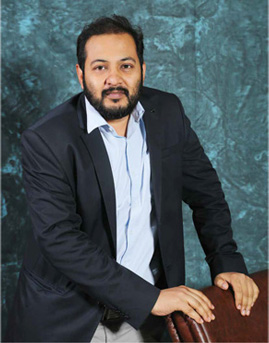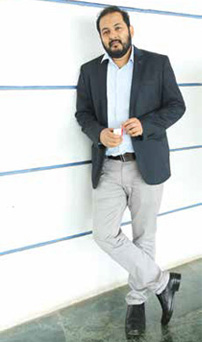An expert in the areas of Human Resource Management, Ranjan Sarkar, Executive Vice President - HR, Exide Industries Limited, has over 20 years of cross-industry experience in Automotive, Energy Storage, Pharmaceutical, Manufacturing, Media, BFSI among many other sectors. Ranjan believes that for India to be a global economic power, India should start manufacturing. He also shares his views on many stereotypes of the HR function and corporate world

I started my work life as a salesman initially. Thereafter, I completed my MBA from SIBM (Symbiosis Institute of Business Management), Pune. When I was thinking about my Master’s I didn’t have any specific goal in my mind as to which management stream to opt. At that time, I was just keen on getting into a good institute for management study. Symbiosis was a good institute and it was offering me a specialization in Human Resource, so I took it.
Earlier to ‘90s, during the license era, most companies were largely focusing on manufacturing. As a result, most HR professionals started their career in the factories. Post liberalization, consumerism developed and hence the innovation and the HR processes started developing around the business HR. Going forward, the world as we see today is slowly moving towards specialists. Even the power equations within an organization will shift from general management to specialists. So I presume there will be new HR processes to be built around managing specialists, R&Ds and knowledge functions. Many HR professionals have not experienced this community ever, because until the year 2000, most R&D and specialist functions were only in the developed countries.
On the other hand, from the 1990s onwards, because of the international trade and markets opening up, a lot of manufacturing got diluted in the country. Therefore, the growth of consumerism and dilution of manufacturing as a core function has swayed a lot of HR professionals into making their careers mostly in business HR, without developing any skill in Industry Relations (IR), environment management, human engineering skills, etc. I think, with Make in India initiative and with a lot of other initiatives, the role of manufacturing HR is coming back. I think India realized that only the service sector’s growth will not help, as the country’s GDP cannot sustain big growth without agriculture and manufacturing.
Countries like China and Taiwan are strong in manufacturing, India has to catch up, and India has to build back the manufacturing base again. It may not be the traditional manufacturing but manufacturing 4.0 (digital manufacturing), which will require another level of HR practices to manage those kinds of setups.
Another big change that I have witnessed is, a lot of people have grown in their careers as a generalist without building specializations. But there are various aspects of HR, which needs some kind of knowledge specialization. I think the world of specialization is coming back, and as an HR professional, there is also a need to have a niche specialization. That being said, what is the difference between earlier specialization vs. today’s specialization? Earlier specialization was very domain based, for example, recruitment management, IR, and so on. The new age specialization will be around events for example, I know how to manage startups, green field assignments, knowledge workers; I can run a digital factory or a digital environment, I am very good in managing employee communication as a subject. From pure disciplines, it will come to a lot of applied disciplines... just like education.
HR is an applied science, it is not pure science. When you are making decisions to deal anything related with people, people are a part of society not just your company, hence the societal influences become very important for understanding for an HR professional. We don’t have sociology as a subject for HR. If I had to recommend a subject for HR, I would recommend sociology, because one has to understand the society. Primary functions of HR needs you to recruit people, train people, reward them, motivate them and so on. But how you do it and what contextual elements one needs to keep in mind while taking decisions. For that, HR needs a very strong understanding of sociology. The world differs in different places in terms of its social behavior, culture, history, people’s values and beliefs, so in this profession, unlike a pure science profession, wherein you are coding or you are working on a particular technology, which is uniform for any culture or a language or a belief because it is pure science. HR profession will require understanding and hence wherever you work or just like understanding local laws, and that’s how I feel it differs, it vastly differs. Many MNCs, have standard processes and systems and many MNCs globally suffered a lot when they tried to standardize their processes across different geographies. Those who have understood this, are successful and have adapted to the local context within a broad principle.
While I have worked in projects for some south Asian countries, those are mainly at a corporate level. But I guess, if I had to run the operations there, I would have to spend some time understand the local culture and then I could I have run it.
Countries like China and Taiwan are strong in manufacturing, India has to catch up, and India has to build back the manufacturing base again. It may not be the traditional manufacturing but manufacturing 4.0

Every generation has its nuances and every generation feels that another generation is different, it is no good, bad, right or wrong in this. The Millennia’s are impatient and they are living a much more risky life than the earlier generation. So if they behave like the earlier generation, trying to be protective, stable, while their life is not stable, they cannot survive, So they have to think here and now. I think the natural evolution of human beings makes them suitable for their generation. If you look at this as a problem, then you will be looking for a solution. I don’t look at it as a problem. I look at it as a particular type of social behavior, which is as per the changing world. Within the umbrella of an organization, if HR is adaptable to the changing environment with terms of social, economic, political, geological and cultural happening, then he/she will automatically find ways to handle diverse groups. We don’t have to be obsessed with - ‘how to deal with the Millennia’s. A good mentor should be working with the millennial, just like a father and son. We are never obsessed about the son who is a millennial. The father just needs a different strategy to interact with him. You hear him out, you understand his concerns, allow him his space, try to help him with his impatience, try to see where his strengths are and help where needed. At an organization level, the organizations which are built over years of wisdom and success even if they are challenged, they will resist it.
Millennia’s will come in and challenge, it is also important to make the younger workforce spend some time with the organization so that they can understand what has taken years to build has a context and how to be part of it, before you challenge it. The multi-generation workforce will exist in a very natural fashion like happens in a family. Organizations nowadays are becoming like a huge joint family, wherein you probably have a Board in the sixties, CXOs in early fifties (from the brick-mortar era) who are like parents, there are middle age employees (30-40 years old) born post-independence (they have seen brick and mortar model shift to digital). They are like elder brothers, young uncles, etc. Then Millennia’s come in, like a teen in the family. I just associate these to family management and I think many answers are pretty simple.
Going forward, many of the jobs in HR may be automated, a lot of jobs will be outdated or not really required. However, there will be a new kind of jobs that will come up within HR. For example, social researcher, insight specialist, manpower study engineers, change managers, business OD, etc.
I do see a lot of similarity in Human Resource function with a government. In a government, you are managing policies, managing processes which affect a lot of people, you have to satisfy the interest of several groups in the country. You have to take stock of how things happen and have to continuously change and adapt. In developing countries, you have to adapt your policies to make changes and you need a lot of communication and change management. If you take the replica of that, that’s the role of HR plays in an organization.
the natural evolution of human beings makes them suitable for their generation. If you look at this as a problem, then you will be looking for a solution. I don’t look at it as a problem
When e-commerce came into the picture, there was a huge outcry that the local shops will disappear. The last I heard, e-commerce is only three per cent in India, which means that brick and mortar have its place and similarly, everything has its place in the world. It is wrong to assume that anything changes everything. It is wrong to think that anyone technological change can bring in a change everywhere in the world, every facet of human life. It doesn’t. It is not a factor of time, it is a factor of habit, convenience and it can be different. For example, for one person ordering online is convenient; for another person, convenience is buying something from a trusted person. Since human beings are different, the needs, wants and beliefs are different. Technology is here to enable a lot of things. Numerous routine jobs will go away, but wherever there is Judgment involved, I don’t think technology has an answer. There is an aspect of emotional Judgment in what we take. The world is talking about data all the time. We in the corporate world consume a lot of data, but when we take a decision, finally it is judgment. Data helps us in studying various alternatives. But a person makes a Judgment, and that Judgment is not exactly an algorithm, it is based on an impulse.
By Vineet Kapshikar